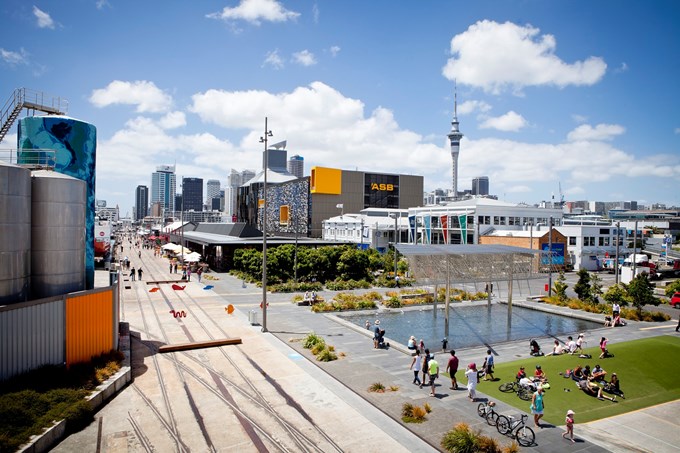“Climate change is one of the most urgent issues we face as a city, a nation and globally.
“It is critical that we take action now to address the risks that it poses and ensure that we leave a positive legacy for our children and grandchildren.
“This consultation shows that Aucklanders support effective action from the council to tackle climate change—something that we will deliver, starting with our plans to slash council carbon emissions by almost 20 per cent, ahead of further and more substantive action in the upcoming 10-year Budget.”
—Auckland Mayor Phil Goff.
Auckland Council’s Environment and Climate Change Committee today voted unanimously to endorse, in principle, changes to the region’s response to climate change based on feedback from Aucklanders. A key change is a focus on three key elements to progress climate action -an overarching Tāmaki response and two core drivers for climate action- reducing our emissions and preparing for change.
Councillor Richard Hills, chair of the committee, says that these elements respond to feedback received during last year’s consultation on Te Tāruke-ā-Tāwhiri: Auckland’s Climate Action Framework.
“There is a strong push from the community for even more urgency,” says Councillor Hills.
“Halving emissions by 2030 is crucial in meeting our emissions targets.”
“While it is of benefit to us all to achieve this, we do also need to take a precautionary approach and prepare for our current emissions pathway, potentially 3.5 degrees warmer across the region.”
“I was proud to see the strong response from Māori and young people. These views have been embedded and we now work to grow this engagement and confront this issue together.”
"It was also great to see a unanimous vote today to progress our climate action planning over the next few months."

Three key elements to drive climate action have been identified as:
- An overarching ‘Tāmaki response’ approach reflecting the uniqueness of Tāmaki Makaurau and the need to embed issues like equity, te ao Māori and a strong rangatahi voice in our response
- A core driver of ‘reducing emissions’ to give us greater clarity on emissions targets, including halving emissions by 2030 and reaching net zero emissions by 2050
- A core driver ‘preparing for climate change’ to give uscr a stronger focus on how we will adapt to climate change, taking a precautionary approach and preparing for our current emissions pathway, potentially a 3.5 degree warmer region.
What did Aucklanders tell us?
Consultation on Te Tāruke-ā-Tāwhiri - Auckland’s Climate Action Framework took place between 17 July and 30 September 2019. Alec Tang, the council’s Acting Chief Sustainability Officer, is pleased that the vast majority of submitters, with nearly 3000 responses, showed overall support for climate action.
“The vast majority of respondents told us that the council absolutely should facilitate action and bring stakeholders together to take climate action,” says Mr Tang.
“They also told us that framework either fully, or partially takes us in the right direction to act on climate change, but that they also wanted to see greater urgency and scale of action.”
“What was particularly pleasing was seeing the positive response following targeted engagement of younger Aucklanders, Māori and Pacific communities. We also received responses from major businesses and industry like energy providers, subject matter expert networks like the New Zealand Green Building Council and Forest and Bird as well as feedback from academic institutions, community groups and trade unions.”
A summary of overall themes received during the consultation include:
- The need for urgency and scale of action. This was strongly reflected in the feedback with respondents saying that there is an increased need for urgency to better reflect the climate emergency declaration that the council made last year. Submitters stressed the need for an increased scale of change, along with a need to better share this need with Aucklanders
- The need for bolder, accelerated targets
- There need for an improved understanding of how key moves work together with a view that the current format implies prioritisation and doesn’t demonstrate interlinkages
- Clarity of roles and responsibilities is seen as key, with a request for more information on who is responsible for actions at each level and the need for partnerships, particularly in relation to central government, rangatahi and mana whenua
- The need for transparent monitoring and evaluation is highlighted, along with a strong appetite for independent bodies, including representation from communities and rangatahi, to monitor progress and support action development
- A greater focus on equity is seen as needing greater definition in the framework
- A strong Māori voice with widespread support for working with Māori, using mātauranga Māori and Māori practices in designing and implementing climate action
- Clear policy and regulation and leading by example is a key piece of feedback, with a strong appetite for the council to lead and increase direction for the region
- Increased communication and behaviour change is strongly supported with a request for campaigns to raise awareness across the region and enable action at an individual level
- Transport is the key move most cited as needing significant change, with the identified actions needing to be delivered at pace and scale.

You can read a summary of the consultation findings and peoples’ perception survey here.
Next steps
Following the Mayoral Proposal for the Annual Budget 2020/2021, which illustrates Mayor Goff’s direction that the council needs to act urgently on the challenge of greenhouse gas emissions and climate change, consultation is now open and you can have your say on the Annual Budget 2020/2021 until 22 March 2020.
Council staff are continuing to incorporate feedback and update the draft framework with the final document planned for a digital launch later this year.


